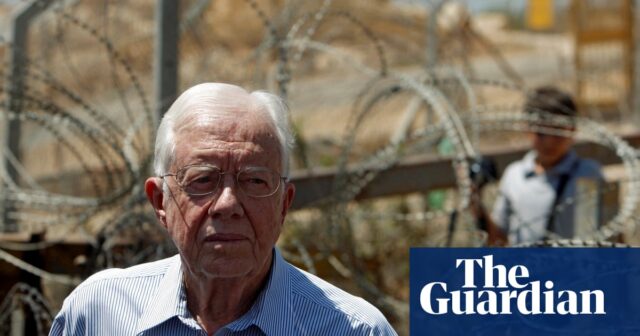Jimmy Carter’s terminal illness reignited a bitter dispute over accusations the former president was antisemitic after he wrote a bestselling book likening the Israeli occupation of the Palestinian territories to South African apartheid.
Prominent American supporters of Israel lined up to denounce Carter and the book, Palestine: Peace Not Apartheid, when it was published in 2006.
Abe Foxman, director of the Anti-Defamation League, called the former president a “bigot”. Deborah Lipstadt, who is now the Biden administration’s special envoy against antisemitism, accused him of having a “Jewish problem”. Alan Dershowitz, the US constitutional lawyer and ardent advocate for Israel, said Carter set out to offend Israelis and Jews.
“Jimmy Carter’s sensitivities seem to have a gaping hole when it comes to Jews. There is a term for that,” he wrote.
Others did not beat around the bush and called Carter an antisemite.
Pro-Israel pressure groups placed ads in the New York Times accusing Carter of facilitating those who “pursue Israel’s annihilation” and claiming he was “blinded by an anti-Israel animus”.
But nearly two decades later, the book looks prescient given that leading Israeli politicians and major human rights organisations now accuse Israel of imposing a form of apartheid on the Palestinians in breach of international laws.
News that Carter had entered hospice care at the beginning of the year prompted calls for critics to apologise for the abuse, drawing an admission from at least one critic.
Among those outraged by Carter’s book in 2006 were members of the former president’s own foundation, which has built an international reputation for its work on human rights and to alleviate suffering. Steve Berman led a mass resignation from the Carter Center’s board of councillors at the time.
Earlier this year, Berman revealed that he later wrote to Carter to apologise and to say that the former president had been right.
“I had started to view Israel’s occupation of the Palestinians as something that started in 1967 as an accident but was now becoming an enterprise with colonial intentions,” Berman said in his letter to Carter.
Shortly before Carter’s death, Peter Beinart, described as “the most influential liberal Zionist of his generation”, said the time had come for the former president’s critics to apologise for the “shameful way that the book was received by many significant people”.
Beinart named Foxman and Lipstadt as among those who “attacked and slandered” Carter even though he brokered the Camp David peace accords between Israel and Egypt in 1978.
“I think there would be something profoundly valuable for some of those folks … to apologise to Carter,” he said.
“The ability to recognise that you are wrong, that certain facts have made it clear I think that what Carter was saying in 2006 was really ahead of its time, and that Carter was not just right but he was showing a very unusual form of political courage.”
In 2021, Kai Bird, author of a recent biography of Carter’s time in the White House, called accusations of antisemitism “an outrage” but said they continue to linger because he was the first president to speak about the need for a “Palestinian homeland” and because he pressured Israel over peace talks with Egypt.
“The former president’s decision to use the word ‘apartheid’ no longer seems a stretch; indeed, today it seems to describe the reality on the ground in the occupied West Bank. I don’t think Carter has a Jewish problem. It’s just the reverse. The American Jewish establishment has a Jimmy Carter problem,” Bird wrote in the Israeli newspaper Haaretz.
Beinart, an Orthodox Jew whose parents immigrated to the US from South Africa, said Carter’s political allies also turned their backs on him.
“He was thrown under the bus by leading members of his own Democratic party,” he said.
That included Nancy Pelosi, who was about to become speaker of the House of Representatives. She said Carter “does not speak for the Democratic party on Israel”.
Carter was also attacked in the press.
The New Republic’s editor-in-chief, Martin Peretz, an ardent supporter of Israel who has since drawn his own accusations of bigotry after calling Arab society “backward” and saying “Muslim life is cheap”, wrote that Carter would “go down in history as a Jew-hater”.
In a book review for the Washington Post, the writer Jeffrey Goldberg accused Carter of “hostility to Israel” in part for failing to recognise that the country “dearly wants to give up the bulk of its West Bank settlements”. Seventeen years later the settlements are still there and expanding.
Carter himself noted that Palestinian voices were largely excluded from the debate about the book. Beinart said that many of the reviews in leading publications were by Jewish Americans while he could not find any by a Palestinian. A New York Times article about the reaction to the book quoted pro-Israel organisations attacking Carter’s motives, but did not include a single view from a Palestinian.
Months after his book’s publication, Carter told the Observer that he did not regret describing the occupation as apartheid.
“The word is the most accurate available to describe Palestine. Apartheid is when two different people live in the same land, and they are forcibly segregated, and one dominates or persecutes the other. That’s what’s happening in Palestine: so the word is very, very accurate. It’s used widely, and every day, in Israel,” he said.
As the former president’s health deteriorated and he withdrew from public view, his foundation, the Carter Center, upset many Israelis further when it called for a ceasefire days after the 7 October Hamas attack by quoting his 2002 Nobel peace prize speech: “We will not learn to live together in peace by killing each other’s children.”
The Center warned that collective punishment and the murder of civilians was contrary to international law – a warning that looks prescient now that Israel’s prime minister, Benjamin Netanyahu, has been indicted for war crimes alongside his former defence minister and the Hamas military leader, Mohammed Deif.






